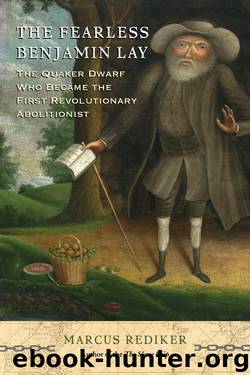The Fearless Benjamin Lay by Marcus Rediker

Author:Marcus Rediker [Rediker, Marcus]
Language: eng
Format: epub
ISBN: 978-0-8070-3593-1
Publisher: Beacon Press
Published: 2017-04-06T04:00:00+00:00
LIBERTY OF THE PRESS
Benjamin took an interest not only in books but in other parts of print culture, especially newspapers. He seems to have spent a good bit of time in the print shops of Benjamin Franklin and Andrew Bradford, selling his own books there and occasionally raising subscriptions to republish books he liked. Here he engaged with the world beyond the debates among Quakers about slavery, as Roberts Vaux pointed out in his biography of Benjamin published in 1815: “Benjamin Lay’s mind was not exclusively directed to the subject of the trade in human flesh, and the shocking train of evils by which it was attended; it observed, and investigated, other objects connected with the interests of civil society and the welfare of man.”24
Of special interest in this regard was an exchange in the Pennsylvania Gazette in April 1738. Franklin republished an article that had appeared three months earlier in the Craftsman in London, a ringing defense of John Peter Zenger, a printer and journalist with the New York Weekly Journal who had criticized New York governor William Cosby, who in turn sued for libel and locked Zenger in jail for eight months in 1733–1734. Defended by the distinguished Philadelphia attorney Andrew Hamilton, Zenger won his case, establishing a crucial legal milestone and precedent for an independent press.25
The author of the first article framed the Zenger case as a struggle for the “Rights and Privileges of Englishmen,” highlighting the courtroom drama. Attorney Hamilton begged presiding royalist judge James DeLancey: “I hope to be pardon’d, Sir, for my Zeal upon this Occasion.” Governor Cosby had abused his authority by harassing the printer “in an extra-judicial and arbitrary Manner”; he, like all “Leaders of the People,” must be called to account. In his closing argument to the jury Hamilton explained, “Many injure and oppress the People under their Administration, provoke them to cry out and complain, and then make that very Complaint the Foundation for new Oppressions and Prosecutions.” The people must therefore oppose “arbitrary Power . . . by speaking and writing TRUTH.” He concluded that the case “may in its Consequence, affect every Freeman that lives under a British Government on the Main of America. It is the best Cause. It is the Cause of Liberty.” Hamilton’s speech moved the jury to return a not-guilty verdict after a brief deliberation. Upon the announcement, “Three great Huzzas” rang out through the hall of justice.
An anonymous gentleman in Philadelphia responded to the reprinted article with ridicule, suggesting that Hamilton was a hypocrite—merely playing popular politics, seeking “veneration among the vulgar” and lacking any principled commitment to “Liberty of the Press.” The hypocrite, he went on, “of all Creatures is generally agreed to be the most detestable and destructive to Society.” He made his point through a double appeal to prejudice. The author of the Zenger defense merits “Shame and Contempt” when he tries “to persuade us, that an Æthiopian is as Fair as a Helen or that Ben Lay is the tallest and straightest Man in America.
Download
This site does not store any files on its server. We only index and link to content provided by other sites. Please contact the content providers to delete copyright contents if any and email us, we'll remove relevant links or contents immediately.
| Anthropology | Archaeology |
| Philosophy | Politics & Government |
| Social Sciences | Sociology |
| Women's Studies |
Nudge - Improving Decisions about Health, Wealth, and Happiness by Thaler Sunstein(7689)
The Fire Next Time by James Baldwin(5423)
iGen by Jean M. Twenge(5405)
Adulting by Kelly Williams Brown(4564)
The Sports Rules Book by Human Kinetics(4377)
The Hacking of the American Mind by Robert H. Lustig(4368)
The Ethical Slut by Janet W. Hardy(4240)
Captivate by Vanessa Van Edwards(3837)
Mummy Knew by Lisa James(3684)
In a Sunburned Country by Bill Bryson(3530)
The Worm at the Core by Sheldon Solomon(3483)
Ants Among Elephants by Sujatha Gidla(3459)
The 48 laws of power by Robert Greene & Joost Elffers(3226)
Suicide: A Study in Sociology by Emile Durkheim(3011)
The Slow Fix: Solve Problems, Work Smarter, and Live Better In a World Addicted to Speed by Carl Honore(3001)
The Tipping Point by Malcolm Gladwell(2908)
Humans of New York by Brandon Stanton(2864)
Handbook of Forensic Sociology and Psychology by Stephen J. Morewitz & Mark L. Goldstein(2691)
The Happy Hooker by Xaviera Hollander(2683)
